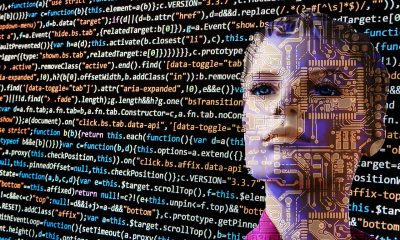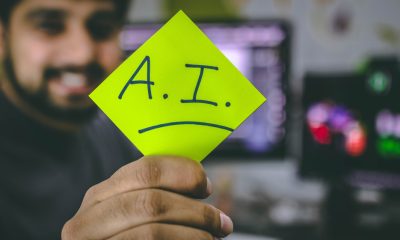Biotech
Metaverse and AI Will Bring the Next Disruption in the Health Sector
Despite the fog that surrounds the metaverse, the report has pointed to it as a driver capable of improving people’s mental health and points to platforms such as Mindful Metaverse or DeepWell Therapeutics, which treat the symptoms of depression and anxiety. The virtual environment will become the next scenario for telemedicine.

From Artificial Intelligence to the metaverse and textile batteries. The next technological disruption that can change the industry is already taking shape and focuses on increasing sustainability and health while improving productivity, as reflected in the latest report presented by the World Economic Forum (WEF), in which he points out the ten emerging technologies that stand out for their disruption this 2023.
Despite the fog that surrounds the metaverse, the report has pointed to it as a driver capable of improving people’s mental health and points to platforms such as Mindful Metaverse or DeepWell Therapeutics, which treat the symptoms of depression and anxiety.
Read more on the subject and find the latest business news of the day with the Born2Invest mobile app.
The virtual environment (metaverse) will become the next scenario for telemedicine
The new technologies based on AI could become an ally of the health sector to anticipate extreme situations such as the one experienced in 2020. These systems would increase the efficiency of health systems at a national and global level to strengthen access to health care and that, as the report itself indicates, would imply improvements in the detection of diseases and the choice of treatments.
Other advances noted by the WEF are design viruses and omic maps, linked to science and the study of the human body. Based on this new technology, it is possible to change the functions of bacteria, making them sensitive to a certain drug or attacking another bacterial species.
World Economic Forum highlights platforms such as Mindful Metaverse or DeepWell Therapeutics
The first place on the list is for Artificial Intelligence, which has gained notoriety in the last year among the population. The WEF pointed out that generative artificial intelligence will serve as a tool to expand the limits of human effort, improve people’s creativity, and will challenge the way of thinking today.
However, the entity clarifies that the capacity and access to the benefits of these new technologies selected in the top 10 by the WEF will depend on the degree of development and infrastructure of each country.
The organization describes generative AI as a technology that stands out for its versatility: it can be used in its own processes in industries as diverse as the pharmaceutical sector and furniture design. The entity points out that the main challenge facing AI now, and in the future, is to meet ethical standards that are approved by the competent regulatory authorities, that end the debate on the attribution of Copyright and be perceived by society as a tool and not a threat.
Another of the challenges of the advances posed by technology is to create net zero data centers. Currently, these spaces spend 1% of the activity produced globally, and the organization points out that the rate will not stop growing year after year with the increase in demand.
First, to address heat management issues, liquid cooling systems are being developed that use water or dielectric coolant to dissipate heat, while excess heat is being reused for applications including space heating. , water heating, and industrial processes. For example, the city of Stockholm is implementing projects to use waste heat from data centers to heat homes.
Second, AI is being used to analyze and optimize energy usage in real-time, maximizing efficiency without compromising performance. The report also notes that the technology infrastructure that underpins net-zero power data centers is becoming more modular and demand-driven, allowing data processing and storage to be distributed across multiple devices and even locations.
__
(Featured image by Pexels via Pixabay)
DISCLAIMER: This article was written by a third party contributor and does not reflect the opinion of Born2Invest, its management, staff or its associates. Please review our disclaimer for more information.
This article may include forward-looking statements. These forward-looking statements generally are identified by the words “believe,” “project,” “estimate,” “become,” “plan,” “will,” and similar expressions. These forward-looking statements involve known and unknown risks as well as uncertainties, including those discussed in the following cautionary statements and elsewhere in this article and on this site. Although the Company may believe that its expectations are based on reasonable assumptions, the actual results that the Company may achieve may differ materially from any forward-looking statements, which reflect the opinions of the management of the Company only as of the date hereof. Additionally, please make sure to read these important disclosures.
First published in PlantaDoce, a third-party contributor translated and adapted the article from the original. In case of discrepancy, the original will prevail.
Although we made reasonable efforts to provide accurate translations, some parts may be incorrect. Born2Invest assumes no responsibility for errors, omissions or ambiguities in the translations provided on this website. Any person or entity relying on translated content does so at their own risk. Born2Invest is not responsible for losses caused by such reliance on the accuracy or reliability of translated information. If you wish to report an error or inaccuracy in the translation, we encourage you to contact us.

-

 Biotech5 days ago
Biotech5 days agoPfizer Spain Highlights Innovation and Impact in 2024 Report Amid Key Anniversaries
-

 Cannabis2 weeks ago
Cannabis2 weeks agoGermany’s Cannabis Crossroads: Progress, Profits, and Public Concern
-

 Markets12 hours ago
Markets12 hours agoStock Markets Surge Amid Global Uncertainty, But Storm Clouds Loom
-

 Cannabis1 week ago
Cannabis1 week agoAurora Cannabis Beats Expectations but Faces Short-Term Challenges






















